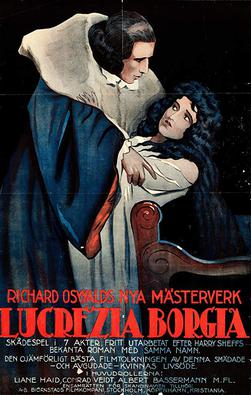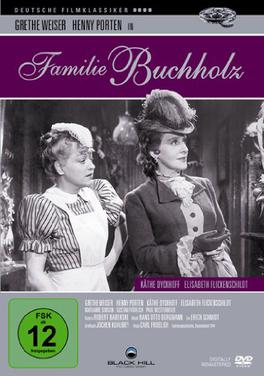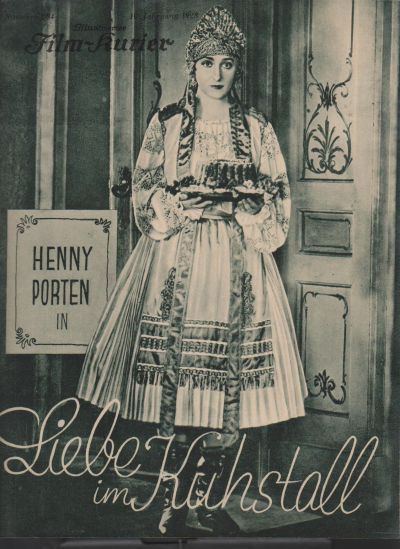Related Research Articles

Unknown Sender is a 1950 West German comedy film directed by Ákos Ráthonyi and starring Henny Porten, Bruni Löbel and Cornell Borchers. It was shot at the Wandsbek Studios in Hamburg. The film's sets were designed by the art director Mathias Matthies.

Frieda Ulricke "Henny" Porten was a German actress and film producer of the silent era, and Germany's first major film star. She appeared in more than 170 films between 1906 and 1955.

Hintertreppe is a 1921 silent film. This was the first movie by German director Leopold Jessner, in cooperation with Paul Leni. Carl Mayer specifically wrote this for Leopold Jessner, who would go on to direct Erdgeist (1923). Hintertreppe was a precursor of the 1920s German kammerspielfilm style.
Homesick is a 1927 German silent drama film directed by Gennaro Righelli and starring Mady Christians, William Dieterle, and Ida Wüst. It was shot at the Terra Studios in Berlin. The film's art direction was by Hans Jacoby. It is set among a group of Russian émigrés living in Paris.

The Vulture Wally is a 1921 German silent drama film directed by Ewald André Dupont and starring Albert Steinrück, Henny Porten and William Dieterle. The film is a bergfilm based on a novel by Wilhelmine von Hillern. It is a melodrama set in the Alps, and was one of Dupont's most successful films of the early 1920s.

Lucrezia Borgia is a 1922 German silent historical film directed by Richard Oswald and starring Conrad Veidt, Liane Haid, Paul Wegener, and Albert Bassermann. It was based on a novel by Harry Sheff, and portrayed the life of the Renaissance Italian aristocrat Lucrezia Borgia (1480–1519). Botho Hoefer and Robert Neppach worked as the film's art directors, designing the period sets needed. It was shot at the Tempelhof Studios in Berlin. Karl Freund was one of the cinematographers. Famed French director Abel Gance remade the film in 1935.

Mother and Child is a 1924 German silent drama film directed by Carl Froelich and starring Henny Porten, Friedrich Kayßler, and Wilhelm Dieterle. It was shot at the EFA Studios in Berlin. It was remade in 1934 as a sound film of the same title also starring Porten.

The Buchholz Family is a 1944 German drama film directed by Carl Froelich and starring Henny Porten, Paul Westermeier, and Käthe Dyckhoff. It is a family chronicle set in late nineteenth century Berlin. It is based on an 1884 novel by Julius Stinde. It was followed by a second part Marriage of Affection, released the same year. It was shot at the Tempelhof Studios in Berlin. The film's sets were designed by the art director Walter Haag.

Louise, Queen of Prussia is a 1931 German historical drama film directed by Carl Froelich and starring Henny Porten, Gustaf Gründgens, and Ekkehard Arendt. The film's art director was Franz Schroedter.

The Long Intermission is a 1927 German silent drama film directed by Carl Froelich and starring Henny Porten, Wolfgang von Schwindt and Livio Pavanelli. It is based upon the play written by Oscar Blumenthal and Max Bernstein.

The Adventures of Sybil Brent is a 1925 German silent film directed by Carl Froelich and starring Henny Porten, Memo Benassi and Rudolf Biebrach. It was shot at the EFA Studios in Berlin. The film's sets were designed by the art director Franz Schroedter.
The Golden Calf is a 1925 German silent drama film directed by Peter Paul Felner and starring Henny Porten, Olga Engl and Rosa Valetti.

Violantha is a 1928 German-Swiss silent film directed by Carl Froelich and starring Henny Porten, Mathilde Sussin and William Dieterle. The film is set in Switzerland and is based on a novel by Ernst Zahn. In 1942 it was remade by Paul May as a sound film under the slightly different title of Violanta.

Love in the Cowshed is a 1928 German silent drama film directed by Carl Froelich and starring Henny Porten, Toni Tetzlaff and Eugen Neufeld. The film's art direction was by Gustav A. Knauer and Willy Schiller. It was distributed by the German branch of Universal Pictures.

Love and Thieves is a 1928 German silent drama film directed by Carl Froelich and Henny Porten, Anton Pointner and Adolphe Engers. The film's art direction was by Franz Schroedter. It premiered at the Ufa-Palast am Zoo and was distributed by UFA as part of the Parufamet agreement.

Escape or Refuge is a 1928 German silent drama film directed by Carl Froelich and starring Henny Porten, Max Maximilian and Margarete Kupfer.
The Count of Charolais is a 1922 German silent historical film directed by Karl Grune and starring Eva May, William Dieterle and Eugen Klöpfer. The film was adapted from the play of the same name by Richard Beer-Hofmann.

Marriage of Affection is a 1944 German historical drama film directed by Carl Froelich and starring Henny Porten, Elisabeth Flickenschildt and Käthe Dyckhoff. It was released as a direct sequel to The Buchholz Family.

A Woman Branded or Dangers of Love is a 1931 German drama film directed by Eugen Thiele and starring Toni van Eyck, Elsa Bassermann and Hans Stüwe. It was shot at the Terra Studios in Berlin. The film's sets were designed by the art director Heinrich Richter.

The Golden Crown is a 1920 German silent film directed by Alfred Halm and starring Henny Porten, Paul Hartmann, and Hugo Pahlke.
References
- ↑ Parish & Canham p.136